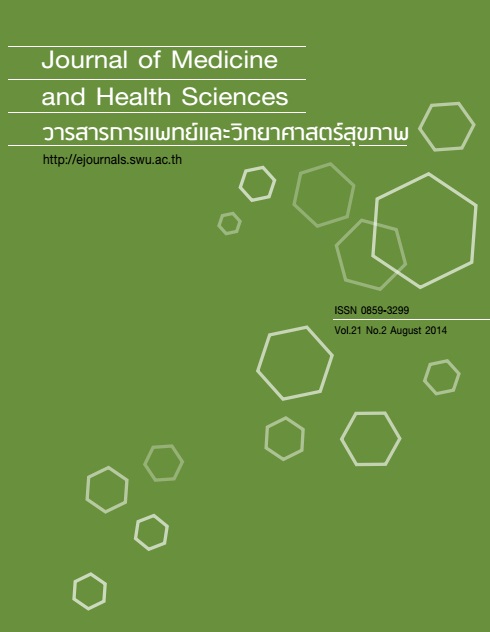Hypoglycaemia disappeared after transarterial chemoembolization in hepatocellular carcinoma
Keywords:
ภาวะน้ำตาลในเลือดต่ำ, มะเร็งตับ, การให้เคมีบำบัดผ่านทางหลอดเลือดแดง, hypoglycemia, hepatocellular carcinoma, transarterial chemoembolizationAbstract
Non-Islet Cell tumour hypoglycaemia associated with hepatocellular carcinoma is an infrequent finding in clinical practice and provides a worse prognosis. The causes of hypoglycaemia are tumour production of insulin-like growth factor II and tumour uptake of glucose. There are many treatment options to control hypoglycaemia and some are unsuccessful. We thereby report a case of hepatocellular carcinoma, in which hypoglycaemia was successfully controlled by a first episode of transarterial chemoembolization.
ความสำเร็จในการรักษาภาวะน้ำตาลในเลือดต่ำจากมะเร็งตับด้วยการให้เคมีบำบัดผ่านทางหลอดเลือดแดง
ภาวะน้ำตาลในเลือดต่ำจากก้อนเนื้องอกที่ไม่ใช่ Islet cell ซึ่งมีความสัมพันธ์กับมะเร็งตับเป็นภาวะที่พบได้ไม่บ่อย ในเวชปฏิบัติและมักมีการพยากรณ์โรคที่แย่ สาเหตุของภาวะน้ำตาลในเลือดต่ำเกิดจากก้อนเนื้อสร้าง insulin-like growth factor-II และการใช้น้ำตาลจากก้อนเนื้องอกโดยตรง มีวิธีการรักษาภาวะดังกล่าวหลายวิธีแต่อาจเห็นผลได้ไม่ดี แพทย์ผู้ให้การรักษาจึงได้รายงานความสำเร็จในการรักษาภาวะน้ำตาลในเลือดต่ำในผู้ป่วยมะเร็งตับตั้งแต่ครั้งแรก ของการให้เคมีบำบัดผ่านทางหลอดเลือดแดงเพื่อรักษามะเร็งตับ



